Climate solutions pose novel problems for global land governance, and importantly, people's rights
Together with our partners Robert Bosch Stiftung and Powershift Africa, TMG organized different sessions at the World Bank Land Conference examining the pivotal role of land rights for a just transition towards a sustainable and carbon-neutral future.
by Frederike Klümper (TMG Research), Alice Stevens (Transparency International), Louisa Prause (Robert Bosch Stiftung) | 2024-05-30
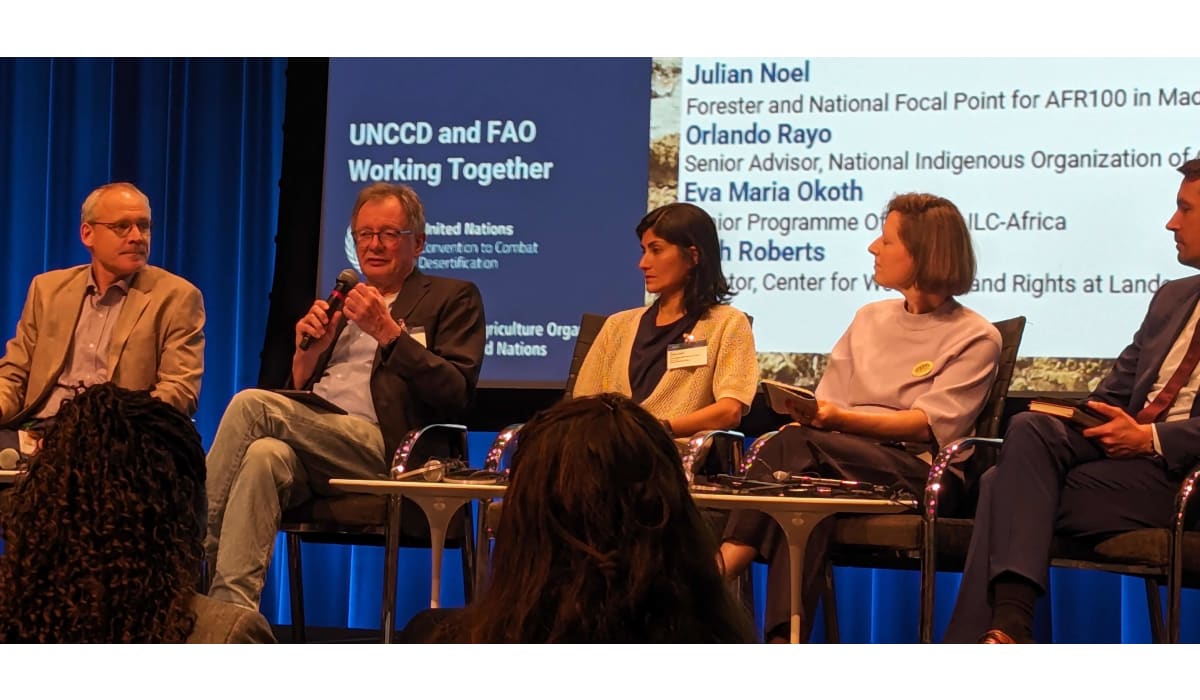
For more than two decades, the World Bank Land Conference has been an important platform that brings together global stakeholders to discuss critical land issues. This year’s conference focused on the intersection of land rights and climate action, emphasizing the importance of secure land rights for sustainable development and effective climate strategies. The conference featured numerous initiatives and discussions aimed at balancing land use demands, ensuring social justice, and achieving climate goals.
What stood out this year: Land is at the centre of the climate crisis. Availability of and access to land is strongly affected by the climate crisis, but land-based measures are also a core part of climate mitigation and adaptation strategies. This interdependence is further complicated by the increasing demand for land due to urbanization and population growth, while climate change is reducing the availability of arable land. This poses novel problems for land rights and global land governance.
Rethinking land: the basis for a just and carbon-neutral future
In collaboration with the Robert Bosch Stiftung and Powershift Africa, TMG organised a session entitled “Securing Land Rights for a Just Transition. Towards a Sustainable and Carbon-Neutral Future.” This session highlighted the critical role of secure land tenure for climate action. The session introduced the Climate-Land Rights Atlas, a project by TMG Research and the Robert Bosch Stiftung, which aims to raise awareness of the impact of land-based CDR and carbon markets on local communities. As countries increasingly deploy land-based carbon dioxide removal (CDR) strategies to fulfil their climate pledges, security of land tenure becomes critical. Secure land rights prevent dispossessions and displacements of local communities. It ensures that local communities get to decide what climate actions, such as afforestation, reforestation and sustainable land management practices are being implemented on their land and that they get to benefit from such projects .The session also discussed, based on examples from Kenya, the potential risks that land-based CDR poses to local communities, especially when land rights are unclear. Without recognized land rights, these climate mitigation strategies can lead to displacement and marginalization.
Marginalization and displacement as a result of climate action is of major concern, especially for women. Maria Wichmann from the German Federal Ministry for Economic Cooperation and Development discussed Germany’s feminist development policy in this regard and highlighted the importance of "strengthening the three R’s - strengthening rights, ensuring equal access to resources, equal representation. This requires empowering the agents of change.” Anne Larson of CIFOR-ICRAF echoed this sentiment, pointing out that securing indigenous, customary and communal land rights requires "strong local governance and stewardship," a point articulated by the Land Gap report.
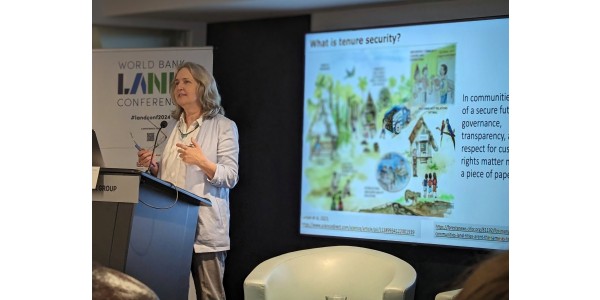
Anne Larson, CIFOR ICRAF
The key takeaway from this session was the need for a holistic approach to land governance that goes beyond the land governance community and puts land centre stage in the international climate policy arena. This requires, for example, a more centralized inclusion of land rights in various global commitments such as the Rio Conventions, the UNCCD’s land degradation targets, the CBD’s 30x30 initiative, and the UNFCCC’s land-based climate action targets.
Implementing climate action must emphasize the central role of governance in protecting and restoring ecosystems, and advocacy is needed for an institutional framework characterized by responsible governance of land tenure. Despite the tacit recognition of their importance, governance challenges remain the proverbial "elephant in the room" in climate policy debates (read more about this in our paper presented at the World Bank Land Conference).

Louisa Prause, Robert Bosch Stiftung
Accountability and human rights: foundations for equitable climate solutions
In addition to governance, ensuring accountability in land governance is also critical to achieving just climate solutions. This was highlighted in a session organized by Transparency International and TMG Research entitled “Achieving Accountability in Land Governance Towards a Just Transition”. Transparent and inclusive land governance is essential for sustainable development and climate resilience.
Ketakandriana Rafitoson, Vice Chair of Transparency International, emphasized the importance of a comprehensive approach: “A multi-sectoral approach that links land governance with human rights is essential to fight corruption and ensure effective climate action.” This idea is crucial to ensure that land governance is not only transparent, but also inclusive and combats various social injustices. A key focus of the discussion was on the importance of effective monitoring tools and approaches towards greater accountability, including consistent and accessible data. As Ward Anseeuw of the FAO observed: “The production and democratization of land data is essential for impactful land governance and sustainable outcomes.” By making government land data accessible, and legitimizing community-led data initiatives, communities and civil society will have better tools to effectively hold government bodies to account.
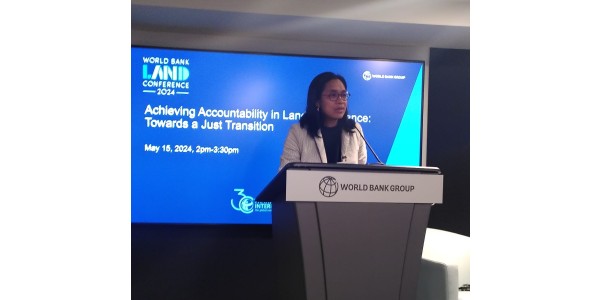
Ketakandriana Rafitoson, Transparency International
Faith Alubbe, CEO of Kenya Land Alliance, further elaborated on the importance of data inclusion and the importance of community-owned data, stating: “Data must carry the constituency, otherwise you are operating in a vacuum.” This emphasizes the need for data to reflect the needs and realities of local communities to ensure that governance strategies are based on actual community conditions and demands. In this context, she referred to examples from the Women’s Land Rights Reporting Tool – Haki Ardhi. Ramesh Sharma, the national coordinator of Ekta Parishad, drew a compelling link between democratic processes and positive land governance outcomes: “You need to adopt democratic means to reach a democratic end, with the end being community-centered land governance.” Sharma’s perspective highlights the importance of participatory governance, where communities have a direct say in the management and stewardship of their lands. Accountability efforts need to actively recognize the risk corruption poses to effective and inclusive land governance – a point which was discussed by Renato Morgado from Transparency International Brazil. He reinforced the point around multi-sectoral collaboration, suggesting a need for collaboration between anti-corruption and land government institutions.
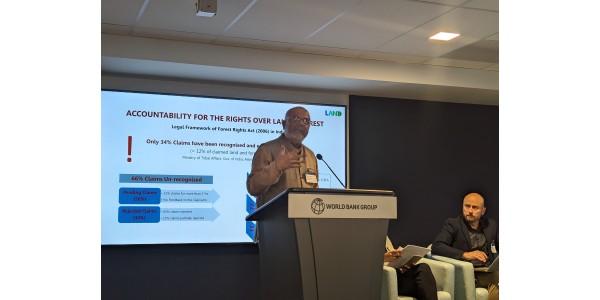
Ramesh Sharma, Ekta Parishad
Key takeaways from the session included the need for the communities to take ownership of monitoring tools and data initiatives to ensure accountability. A strong case was also made for the integration of human rights into land governance programs, emphasizing the critical role of secure land tenure for climate action mitigation and sustainable development. The human rights-based voluntary guidelines on responsible land governance were recognized as a pathway to responsible land governance and strengthening accountability.
Looking ahead: Three COPs in one year – an opportunity to strengthen land rights beyond the land rights community?
The World Bank's 2024 Land Conference highlighted the essential role of secure land tenure in achieving climate goals. However, there is still significant work to be done to place secure tenure even more strategically in the context of the three Rio Conventions. A joint FAO–UNCCD session aimed to strengthen cooperation between partners, countries and donors to prioritize considerations of land tenure and sustainable land management. Alexander Müller, Managing Director of TMG Research, highlighted TMG Research’s case studies from Benin, Kenya, Madagascar and Malawi on monitoring the implementation of the UNCCD decision on land rights and explained how this has helped to define solutions pathways. He stated: “Recognition of land rights in the Conventions is on the rise” and referred to the UNCCD Decision 26/COP.14 of COP14, which represents an important step towards mainstreaming land rights and recognizes land tenure security with a strong focus on community actions as a catalyst for land degradation neutrality.
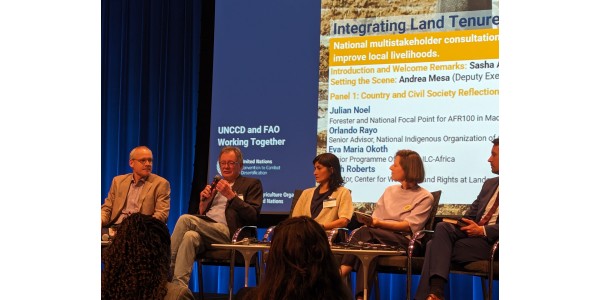
Alexander Müller, TMG Research
In June 2024, TMG Research and the Robert Bosch Stiftung are seizing the momentum and will host a strategic workshop to promote decentralised action and catalyse joint messages from civil society organisations on the critical role of women's land rights in the implementation of all three Rio Conventions.
Land has become a critical solution on the world stage for climate and environmental action, including conservation and restoration efforts. A global governance approach is needed to address the increasing demand for limited land. Treating land as one unified system, rather than multiple fragmented entities, is essential for achieving realistic global climate goals.
 Urban Food FuturesFeb 09, 2026
Urban Food FuturesFeb 09, 2026Pushing the horizon: Urban farming and community-led innovation in Mukuru informal settlement
A small community-run greenhouse in Mukuru is offering insights into how controlled-environment agriculture can strengthen food security in urban environments under increasing pressure—and a look into the future of food systems in informal settlements.
Christian Sonntag, Emmanuel Atamba, Lumi Youm
 Land GovernanceDec 18, 2025
Land GovernanceDec 18, 2025Land tenure, women’s land rights, and resilience: Reflections from CRIC23 toward UNCCD COP17
Our experts discuss what the exchanges at CRIC23 highlighted and revealed about the role of secure and gender-equitable land tenure in the UNCCD's work ahead of the 2026 triple COP year.
Frederike Klümper, Washe Kazungu
 Urban Food FuturesDec 09, 2025
Urban Food FuturesDec 09, 2025The story of Mukuru's Urban Nutrition Hub
In Mukuru informal settlement, a safe haven for women has grown into the Urban Nutrition Hub, a multi-purpose space for nutrition education, training, and community development, demonstrating the potential of grassroots community-owned innovation..
Serah Kiragu-Wissler


